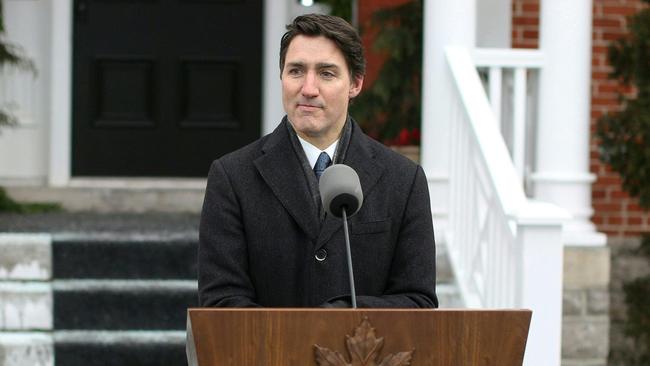
Once a spending program is initiated, it almost invariably takes on a life of its own and the dollars that need to be committed grow quickly. This is particularly the case with what are known as demand-driven programs. As long as recipients meet the criteria of the program, then the spending follows like night follows day.
I was reminded of this truth while I was researching the budget position in Canada, prompted by the resignation of long-serving Prime Minister Justin Trudeau. I had a hunch things weren’t going well in that country, fiscally speaking, but I was unaware of the details.
In December a mini-budget was handed down in which it was revealed that last financial year’s budget deficit had blown out by more than $C20bn ($22.3bn) to reach $C62bn.
This outcome violates the government’s own fiscal rules that the annual deficit should not exceed $C40bn. Deficits are forecast for the rest of the decade.
One chart in the budget papers – the statement went by the corny title Fairness for Every Generation – particularly caught my eye. It illustrated the expenditure on various entitlement programs across the period 2015-16 to 2025-26. Note that Trudeau came to power in 2015.
The heading was Investing in Benefits for Canadians, which presumably was chosen because it had a better political ring to it than the Cost of Entitlements.
Across this period the left-leaning Trudeau government introduced several new programs as well as enhancing others.
The key ones are Canada Child Benefit; Canadian Dental Care Plan and Dental Benefit; and $10-a-day Child Care. At the beginning of the period, spending on these entitlement programs was about $C64bn. By 2025-26 it is expected that spending will have reached $C140bn. These figures are in real terms. In other words, spending on these entitlement programs is expected to more than double in the decade.
While Australia is slightly lagging Canada on some of these programs, we are not far behind and we do have the NDIS National Disability Insurance Scheme as one of the largest spending programs with its phenomenal growth in annual expenses.
The two Canadian examples of providing “free” dental care and $10-a-day childcare are important ones. These programs started off relatively small in spending terms but the expenses have quickly blown out.
This is because the users respond to the incentives and the behaviour of the providers changes. Instead of spending their own money to go to the dentist, people rationally make the switch to the “free” scheme. Dentists are then in the box seat to determine the treatment plan, subject to any restrictions of the scheme.

In the case of childcare – the $10-a-day scheme is seen as attractive to the Albanese government – the negotiations between the provinces and childcare centres to implement the arrangement have been tortuous. There are pages of possible top-up funding items and there is a perception that this is being widely gamed by the mainly private providers.
In effect the governments, federal and provincial, are having to prop up the most marginal centres to meet the political promise of universal childcare. This is proving to be very expensive and not completely achievable in any case.
If we look at the top 20 programs by expense in Australia, we observe that total spending is expected to rise from $691bn in 2023-24 to $830bn in 2027-28, an increase of $139bn or just more than 20 per cent.
Leaving aside revenue assistance to the states and territories, the NDIS was the second largest program at $44bn in the 2023-24 financial year, just behind support for seniors (principally the age pension). In 2027-28, close to $61bn is expected to be spent on the NDIS, and that is based on optimistic assumptions about achieving lower growth rates in spending than in the past.
Other large spending programs are aged care, Medicare, the Disability Support Pension, pharmaceutical benefits, support for non-government schools and childcare subsidies.
Reflecting the accumulation of government debt that has occurred across the past nearly two decades, the fastest growing spending item is net interest payments. The main observation to make is that, absent any major change to the parameters or indeed the elimination of the big programs, the strong upward trajectory of government spending is effectively locked in.
The benefits become part of people’s points of reference, including the middle class, and therefore any reduction in entitlements is deeply politically unpopular. It’s the principal reason governments find it so hard to control spending. An opposition that proposes to trim entitlements is quickly accused of heartless austerity. In any case, a great deal of program spending is stipulated in legislation; legislative change is therefore required to alter the course of funding.
This problem now affects all advanced economies. In France and the US, the current budget deficits are more than 6 per cent of GDP, with rapid growth in government debt. Attempts by the Macron government in France to trim some of the extremely generous entitlements enjoyed by French citizens – by increasing the retirement age, for instance – largely have failed.

While the incoming Trump administration intends to slash government spending through the Department of Government Efficiency, there is no plan to touch entitlements such as social security benefits.
Many countries have operated on the basis that growth can outrun the cost of debt and thereby bring the budget under control. This has generally met with very little success. And while inflation is unpopular among voters, it does serve to reduce the real value of government debt.
The inexorable rise in the cost of entitlements has been brought into greater focus with the global sell-off of bonds. The yields on long-dated government securities have been rising in most advanced economies, including Britain, France, the US, Canada and here.
What this means is that the cost of servicing government debt suddenly becomes more expensive and the credit ratings of a number of countries are suddenly up for review.
It seems a long time ago when Costello gave his wise advice. It’s almost impossible to recall the root-and-branch examination of government spending undertaken by Labor treasurer Paul Keating and finance minister Peter Walsh in the late 1980s.
The result was strict means testing of many government benefits, an arrangement that has been wound back in recent times. Think here the non-means-tested NDIS and the $530,000 a year household income cap for childcare subsidies.
These days, governments are only too happy to use other people’s money in an attempt to secure enough votes to stay in power. There is little evidence that careful consideration is given to the costs and benefits of new programs or altering existing ones.
It probably takes a crisis such as the one Argentina faced and an exceptional political leader such as Javier Milei to achieve a substantial cut in the size of government. It’s just a pity that it requires such a damaging economic and societal crunch for politicians to act.





One of the wisest pieces of advice former treasurer Peter Costello ever gave is this: the best way to control spending is not to spend in the first place.